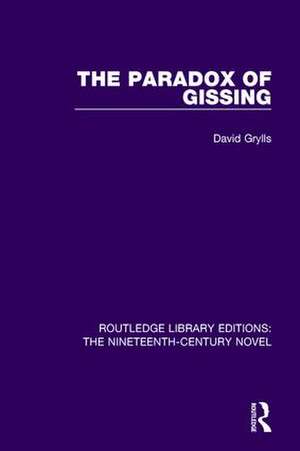The Paradox of Gissing: Routledge Library Editions: The Nineteenth-Century Novel
Autor David Gryllsen Limba Engleză Hardback – 19 iul 2016
| Toate formatele și edițiile | Preț | Express |
|---|---|---|
| Paperback (1) | 351.66 lei 6-8 săpt. | |
| Taylor & Francis – 12 dec 2017 | 351.66 lei 6-8 săpt. | |
| Hardback (1) | 847.73 lei 6-8 săpt. | |
| Taylor & Francis – 19 iul 2016 | 847.73 lei 6-8 săpt. |
Din seria Routledge Library Editions: The Nineteenth-Century Novel
- 34%
 Preț: 764.20 lei
Preț: 764.20 lei - 19%
 Preț: 237.93 lei
Preț: 237.93 lei - 36%
 Preț: 847.73 lei
Preț: 847.73 lei - 36%
 Preț: 496.94 lei
Preț: 496.94 lei - 54%
 Preț: 515.00 lei
Preț: 515.00 lei - 38%
 Preț: 764.20 lei
Preț: 764.20 lei -
 Preț: 351.66 lei
Preț: 351.66 lei - 39%
 Preț: 680.73 lei
Preț: 680.73 lei - 19%
 Preț: 237.93 lei
Preț: 237.93 lei - 37%
 Preț: 625.03 lei
Preț: 625.03 lei - 39%
 Preț: 680.73 lei
Preț: 680.73 lei - 38%
 Preț: 764.20 lei
Preț: 764.20 lei - 36%
 Preț: 823.17 lei
Preț: 823.17 lei - 52%
 Preț: 473.94 lei
Preț: 473.94 lei -
 Preț: 343.00 lei
Preț: 343.00 lei - 38%
 Preț: 764.20 lei
Preț: 764.20 lei - 37%
 Preț: 625.03 lei
Preț: 625.03 lei -
 Preț: 351.66 lei
Preț: 351.66 lei - 49%
 Preț: 541.50 lei
Preț: 541.50 lei - 36%
 Preț: 819.90 lei
Preț: 819.90 lei - 19%
 Preț: 241.15 lei
Preț: 241.15 lei - 37%
 Preț: 485.78 lei
Preț: 485.78 lei - 38%
 Preț: 764.20 lei
Preț: 764.20 lei - 37%
 Preț: 625.03 lei
Preț: 625.03 lei - 39%
 Preț: 680.73 lei
Preț: 680.73 lei - 34%
 Preț: 764.20 lei
Preț: 764.20 lei - 38%
 Preț: 764.20 lei
Preț: 764.20 lei -
 Preț: 353.57 lei
Preț: 353.57 lei - 54%
 Preț: 513.61 lei
Preț: 513.61 lei - 37%
 Preț: 625.03 lei
Preț: 625.03 lei - 52%
 Preț: 473.94 lei
Preț: 473.94 lei - 37%
 Preț: 625.03 lei
Preț: 625.03 lei - 55%
 Preț: 652.84 lei
Preț: 652.84 lei - 38%
 Preț: 764.20 lei
Preț: 764.20 lei - 37%
 Preț: 625.03 lei
Preț: 625.03 lei - 21%
 Preț: 259.07 lei
Preț: 259.07 lei - 36%
 Preț: 847.73 lei
Preț: 847.73 lei - 37%
 Preț: 15600.30 lei
Preț: 15600.30 lei - 37%
 Preț: 625.03 lei
Preț: 625.03 lei - 38%
 Preț: 765.01 lei
Preț: 765.01 lei - 36%
 Preț: 847.73 lei
Preț: 847.73 lei - 37%
 Preț: 625.03 lei
Preț: 625.03 lei
Preț: 847.73 lei
Preț vechi: 1324.17 lei
-36% Nou
Puncte Express: 1272
Preț estimativ în valută:
162.21€ • 176.75$ • 136.69£
162.21€ • 176.75$ • 136.69£
Carte tipărită la comandă
Livrare economică 23 aprilie-07 mai
Preluare comenzi: 021 569.72.76
Specificații
ISBN-13: 9781138649774
ISBN-10: 1138649775
Pagini: 242
Dimensiuni: 156 x 234 mm
Greutate: 0.45 kg
Ediția:1
Editura: Taylor & Francis
Colecția Routledge
Seria Routledge Library Editions: The Nineteenth-Century Novel
Locul publicării:Oxford, United Kingdom
ISBN-10: 1138649775
Pagini: 242
Dimensiuni: 156 x 234 mm
Greutate: 0.45 kg
Ediția:1
Editura: Taylor & Francis
Colecția Routledge
Seria Routledge Library Editions: The Nineteenth-Century Novel
Locul publicării:Oxford, United Kingdom
Cuprins
Acknowledgements; Preface; 1 Pessimism and Will Power 2 Workers and Reform 3 Art and Commercialism 4 Poverty, Intellect and Exile 5 Women, Feminism and Marriage; Conclusion; Bibliography of Gissing’s Works; List of Abbreviations; Notes; Index
Descriere
First published 1986. In this book the author refutes the notion that Gissing’s weaknesses as a novelist are associated with defects in his personality and argues that the power of his writing stemmed from his divided character. Gissing’s permanently divided emotions on poverty, reformism, women and art were, at his best, the reason he could write so convincingly about them. This analysis of Gissing’s imagination and the fictional development in his major works shows that the effectiveness of his novels depends largely on these dichotomies and opposites. This work covers the whole range of Gissing’s writing and relates it to its social and intellectual milieu.
